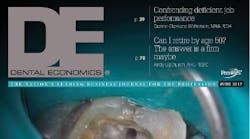Key components of a bonus plan for your dental team
There are many team bonus plans in dentistry, and I have tried most of them through the years. Many of these bonus plans have shortcomings that can sometimes hurt instead of help the practice.
But the right bonus plan will turn your employees into team members. Team members take on the responsibility of running their areas of the practice, therefore lowering your stress. Employees see running the practice as your responsibility, so they wait for you to tell them what to do, which therefore increases your stress.
There are nine key components of any good bonus plan that must be present in order for it to work properly.
- The bonus plan must be based on the profit of the practice.
Profit is the money that is left over after all the bills are paid. The bonus plan must be calculated from an overhead base that is the accurate cost to operate your practice. This base must increase over time as the practice grows and the overhead increases along with the profit.
- Every team member must participate equally in the bonus.
Bonus plans that reward one team member or one position over another lead to unwanted competition and hurt feelings. The objective of the bonus is to get your team members to work together as a team, not as individuals.
- The bonus must be paid monthly.
If team members have to wait too long to receive their bonuses, then the motivational impact becomes diluted. A bonus that is paid every two or three months causes the team to wait too long, which diminishes the incentive. Many team members live from paycheck to paycheck, so they want their bonuses now, not in two or three months.
- The bonus must be an amount that will make a significant difference.
A $50 bonus is not going to generate much excitement, but a $500 or $1,000 bonus will. You might be thinking that there is no way you can afford to pay that kind of bonus. What if your monthly practice revenue increased by 50% to 100%? Then could you afford to pay that kind of bonus? Sure, you could! This is what happens when you have a motivated team working with you as opposed to employees working for you.
- The bonus must be paid from collections, not production.
Production doesn’t pay the bills. Collections do. A bonus based on production will cause patients to be scheduled with either no or flimsy financial arrangements. You want the team focused on collecting the revenue as opposed to producing the revenue.
- The bonus calculations must be available for everyone to see.
The team must be able to see how the bonus was calculated and what each team member received as a bonus. It is only natural for them to doubt that they’re getting their fair share if bonus calculations are kept secret. They don’t need to see your detailed profit and loss statement, but they do need to know the total overhead, the collections, and how the bonus was calculated.
- The bonus goal must be realistic.
Here’s an example: if you’re collecting $60K per month and the bonus goal is $120K per month, your team will probably think the goal is not possible. Team members must believe they can achieve the goal by hearing your plan for reaching this goal. Team members also need to know what their individual bonuses will be when this monthly goal is reached.
- The doctor must be the biggest cheerleader for the bonus.
When the team makes bonus, you need to be excited for them. Remember, the bonus does not cost you money; it makes you money. There’s no way you would be making the new and higher collection numbers if it wasn’t for the bonus plan. Paying the bonus begrudgingly, or worse, reneging on the deal, is the quickest way to demotivate your team.
- There must be a probationary period for new team members to participate in the bonus.
When new people are hired, they should have a two- to three-month waiting period before they can participate in the bonus. This gives the rest of the team time to get a person up to speed and contributing to the profit of the practice.
A good bonus plan will lead to an empowered team that will lower your stress and increase your income.
Michael Kesner, DDS, has a practice that ranks on the Inc. 5000 list as one of the fastest growing companies in America. He is the author of Multi-Million Dollar Dental Practice and the CEO of Quantum Leap Success in Dentistry, which teaches more production, higher profits, and less stress. Contact him at [email protected].
About the Author
Michael Kesner, DDS
CEO
Michael Kesner, DDS, built a group of 14 practices that ranked five years in a row on the Inc. 5000 List of America's Fastest Growing Companies. He is author of the book Multi-Million Dollar Dental Practice and founder/president of Quantum Leap Consulting, which partners with dental practices for faster growth. Contact Dr. Kesner at [email protected].
Updated January 19, 2020
